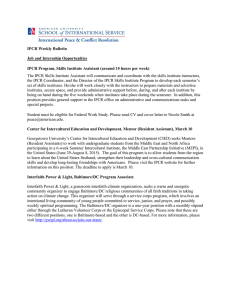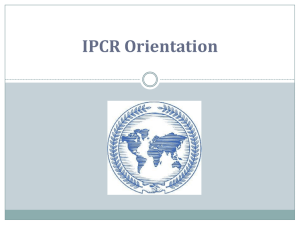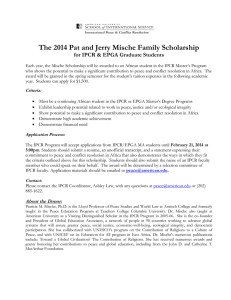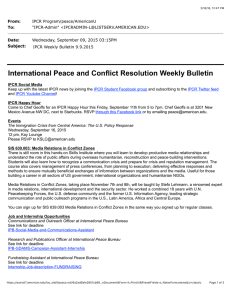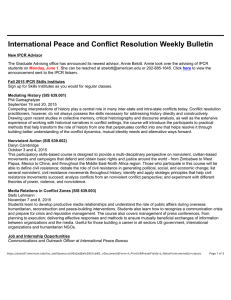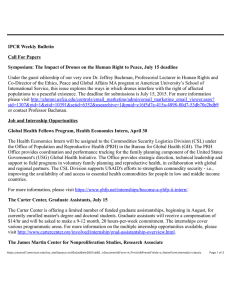NEWSLETTER Peace Student
advertisement
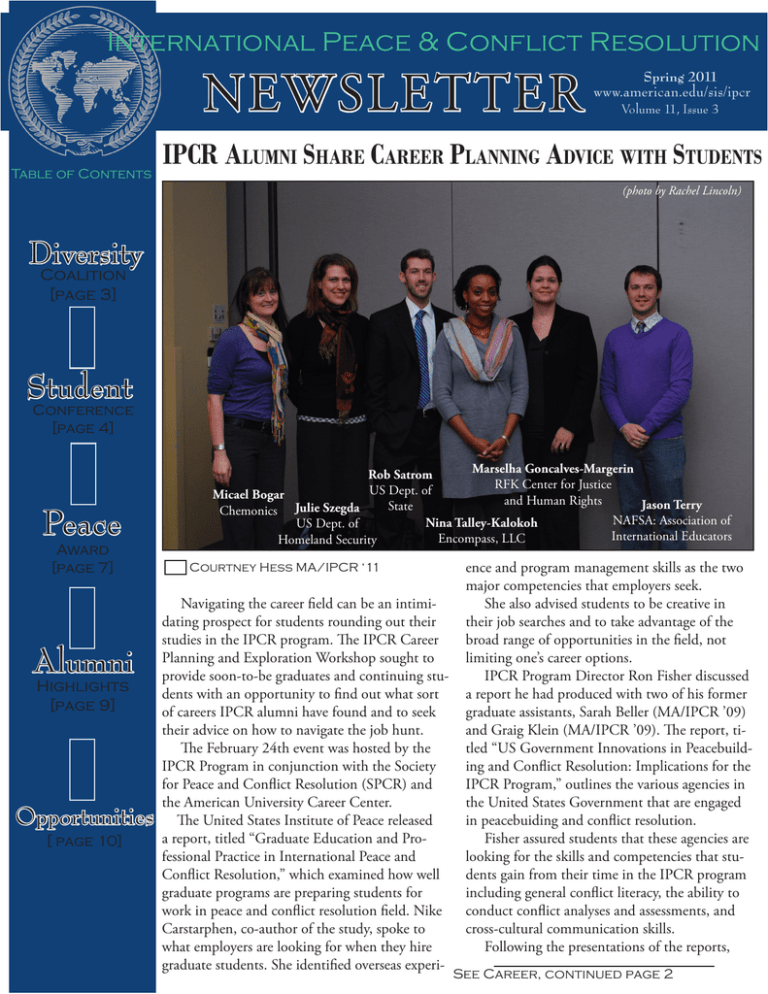
International Peace & Conflict Resolution NEWSLETTER NEWSLETTER Table of Contents Spring 2011 www.american.edu/sis/ipcr Volume 11, Issue 3 IPCR Alumni Share Career Planning Advice with Students (photo by Rachel Lincoln) Diversity Coalition [page 3] Student Conference [page 4] Peace Award [page 7] Alumni Highlights [page 9] Opportunities [ page 10] Marselha Goncalves-Margerin Rob Satrom RFK Center for Justice US Dept. of Micael Bogar and Human Rights Jason Terry State Chemonics Julie Szegda NAFSA: Association of Nina Talley-Kalokoh US Dept. of International Educators Encompass, LLC Homeland Security Courtney Hess MA/IPCR ‘11 Navigating the career field can be an intimidating prospect for students rounding out their studies in the IPCR program. The IPCR Career Planning and Exploration Workshop sought to provide soon-to-be graduates and continuing students with an opportunity to find out what sort of careers IPCR alumni have found and to seek their advice on how to navigate the job hunt. The February 24th event was hosted by the IPCR Program in conjunction with the Society for Peace and Conflict Resolution (SPCR) and the American University Career Center. The United States Institute of Peace released a report, titled “Graduate Education and Professional Practice in International Peace and Conflict Resolution,” which examined how well graduate programs are preparing students for work in peace and conflict resolution field. Nike Carstarphen, co-author of the study, spoke to what employers are looking for when they hire graduate students. She identified overseas experi- ence and program management skills as the two major competencies that employers seek. She also advised students to be creative in their job searches and to take advantage of the broad range of opportunities in the field, not limiting one’s career options. IPCR Program Director Ron Fisher discussed a report he had produced with two of his former graduate assistants, Sarah Beller (MA/IPCR ’09) and Graig Klein (MA/IPCR ’09). The report, titled “US Government Innovations in Peacebuilding and Conflict Resolution: Implications for the IPCR Program,” outlines the various agencies in the United States Government that are engaged in peacebuiding and conflict resolution. Fisher assured students that these agencies are looking for the skills and competencies that students gain from their time in the IPCR program including general conflict literacy, the ability to conduct conflict analyses and assessments, and cross-cultural communication skills. Following the presentations of the reports, See Career, continued page 2 IPCR News P 2 International Peace and Conflict Resolution age Career, continued from page 1 students were given an opportunity to interface directly with alumni, who, just a few years ago, were in their same position, preparing to enter the job field. Career Center Advisor John Charles advised students to take advantage of IPCR alumni when looking for jobs and career advice. “They are people who can be instrumental in launching you in your career after AU,” Charles said. In a modified speed-networking format, each alumnus hosted a round table where current students could not only learn about their career path but also ask particular questions that alumni from the same program were well-equipped to answer. Charles thought the unique format was a good departure from the traditional panel discussion seen at many similar events. “The chance to have conversations in round table form allowed so much more back and forth,” he said. Students also reported that they gained useful insight from the event. “It is good to hear what people are doing in their jobs and brainstorm what you are looking for, even if you don’t get there right away,” said Elli Simon (MA/IPCR ’12) For second year student Alison Drury (MA/IPCR ’11), the event offered confirmation and assurance. “I feel better about where I am right now,” she said. “I have new directions and insights on how to get there.” First year student Johannes Langer appreciated the reminder that there is life after graduate school. “It was very helpful,” he said, “it reminded me that when reading for class to keep in mind that you need it for practice too.” The event was also an opportunity for alumni to give back to the IPCR community. Nina Talley-Kalokoh (MA/IPCR ’09) appreciated the opportunity to return to AU to talk about her work as a Program Coordinator for EnCompass, LLC. “Some of the most influential experiences I had at AU were in interacting with alumni,” she said. “It is nice to be able to contribute.” For more information: USIP Report: http://www.usip.org/files/resources/sr246.pdf Prof. Fisher’s report: http://www.american.edu/sis/ipcr/upload/US-Government-Innovations-in-Peacebuilding-11-29-10-with-Exec-Summary.pdf Career Center: http://www.american.edu/careercenter/ SIS, American University 4400 Massachusetts Ave NW, Washington, DC 20016 Ronald Fisher, Director IPCR rfisher@american.edu, 202-885-1547 Abdul Aziz Said, Founding Director IPCR Mohammed Said Farsi Chair of Islamic Peace asaid@american.edu, 202-885-1622 Maura Scully, Farsi Chair Coordinator Office of Abdul Aziz Said, 202-885-1632 scully@american.edu Rebecca Davis, IPCR Coordinator peace@american.edu, 202-885-1622 Marley Crutcher, Academic Advisor, IPCR crutcher@american.edu, 202-885-1733 Center for Global Peace Mohammed Abu-Nimer abunimer@american.edu, 202-885-1656 Peacebuilding & Development Institute Laurie Segel-Moss, Associate Director pdi@american.edu, 202-885-2014 Journal of Peacebuilding and Development jpd.subscriptions@gmail.com IPCR Skills Institute Program Mohammed Abu-Nimer, Faculty Director abunimer@american.edu, 202-885-1656 IPCR-Wesley Seminary Dual Degree Program Charles Call, Faculty Director call@american.edu Ethics, Peace & Global Affairs Joint Degree Julie Mertus, Co-Faculty Director mertus@american.edu Dialogue Development Group Anas Alabbadi, President ddg@american.edu Society for Peace and Conflict Resolution Courtney Hess, President spcr@american.edu Sudents meet with alumna Nina TalleyKalokoh for a round table session during the workshop (photo by Rachel Lincoln). Creative Peace Initiatives Maria Gahan, Kate Elci, Co-Presidents cpi@american.edu Society for Ethics, Peace & Global Affairs Niki Jawerth, President sepga@american.edu AU Negotiation Project Trace Main, President aunegotiationproject@gmail.com IPCR Senator Derek Tobias, derek.tobias@gmail.com IPCR Feature P 3 age IPCR Focusing on Diversity and Inclusion Rebecca Davis MA/IPCR ‘11 The IPCR Coalition for Diversity and Inclusion is moving forward in its effort to increase recruitment and retention of domestic minority students in the program. Like the IPCR Program itself, the Coalition was catalyzed by students themselves. IPCR Director Ron Fisher sees the focus of the Coalition as representative of “IPCR’s commitment to cultural diversity and political pluralism rooted in our core values of empowerment, equality and social justice.” Mission Statement The IPCR Coalition for Diversity and Inclusion is dedicated to improving access, inclusion, and retention of historically under-represented domestic students of color in the IPCR Community. The Coalition works to provide leadership in developing and implementing strategies to advance the university’s strategic goal to reflect and value diversity. The seeds for the Coalition were planted nearly three years ago when IPCR students Elli Nagai-Rothe (MA/IPCR ’10) and Nina Talley-Kalokoh (MA/IPCR ’09) approached Director Ron Fisher about intentionally working on increasing the numbers of students and faculty of color in the program. With a shared concern about minority representation, not just in the program, but also in the field of peace and conflict resolution, the issue was discussed at the annual IPCR Program Retreat in the spring of 2009. By the fall of 2009, IPCR had created the Diversity Task Force, which has since changed its name to the IPCR Coalition for Diversity and Inclusion. The Coalition is a collaboration of faculty, staff, and students associated with IPCR, all of whom are dedicated to bringing in greater diversity to the program. The group currently includes IPCR Professors Said, Fisher, and Nuamah; IPCR Staff Rebecca Davis and Maura Scully; IPCR Students Brittany Gates (MA/IPCR ’11), Robbie Kleepko (MA/IPCR ’12), Neha Raval (MA/IPCR ’12), and Lydia Melton (MA/IPCR ’12); IC Professor Wanda Wigfall-Williams who is Associate IPCR faculty, and SIS Graduate Admissions Director Amanda Taylor. Lydia Melton connected her work on the Coalition to her own experience. “I decided to be on the Coalition because students who come from the same background as me, sometimes don’t believe they can get into—and even graduate from—prestigious schools such as American University. Being a part of the Coalition gives me the opportunity to find, encourage and help those students to apply and matriculate into AU.” Now in its second year, the group is working on both recruitment and retention, hoping to contribute to the creation of a sense of community in the campus climate that appeals to all students. All new SIS graduate students of color were welcomed with a breakfast reception during Portal Orientation in the fall that gave them an opportunity to meet each other as well as second year students. The community builder was well attended and will likely be built into each year’s portal going forward. The Coalition is focusing on several action items during this spring, some focused on reaching out to newly admitted students, and some in preparation for the next admissions cycle. Looking ahead, Fisher commented, “The Coalition is well placed to make important contributions to AU’s strategic goal to reflect and value diversity through a combination of advocacy, service and collaboration.” Wanis-St. John Launches New Book Secrecy is a tool invoked by everyone on a daily basis. It is used to signal a degree of familiarity, trust and intimacy between individuals. It is also used as a tool of negotiations, a means of efficiency unencumbered by the media. But are there instances when secrecy can be taken too far in negotiations? This is the theme Professor Anthony Wanis-St.John examined in his new book Back Channel Negotiation: Secrecy in the Middle East Peace Process, and in his Faculty Tea held on February 15th. The Faculty Tea series, sponsored by the Society for Peace and Conflict Resolution (SPCR) and the IPCR Program, provides an opportunity for students and the IPCR community to get to know what faculty members are working on outside of the classroom. This faculty tea doubled as a book launch celebrating the December release of Wanis-St. John’s book. The event was also co-sponsored by the Middle East Studies Program, and drew a crowd of over forty graduate students, undergraduate students, staff, faculty, and community members. Wanis-St. John gave students an idea of the scope of this research project, a book that is a compilation of more than a decade’s examination of behind the scenes negotiations in the Israeli-Palestinian peace process. The recent Al-Jazerra leaks concerning the Palestinian Liberation Organization’s negotiation strategies provided a timely connection to WanisSt. John’s research on secrecy. “The original need (photo by Annie Lyon) [for secrecy] does not go away,” explained Wanis-St. John, “it is multiplied because the cause for concern is what causes secrecy.” The breach of what was perceived as secure informs the need for increased secrecy, as leaders become more reliant upon oral rather then documented means of negotiation. Wanis-St. John also highlighted the importance of ensuring public awareness of agreements prior to implementation. Implementation out of secret negotiations can destroy the established relationship between the public and the negotiators and with the potential for an ensuing state of chaos. IPCR Feature P 4 age Innovations in Student Leadership Conference On February 26th, the Society for Peace and Conflict Resolution hosted the 2011 Innovations in Student Leadership Conference at the School of International Service. In its fifth year, the conference focused on the timely topic of the role of the media in conflict resolution. With recent events in North Africa, it served as a terrific forum to discuss how media is being used to mobilize and communicate information during critical moments. The conference brought together students, academics, and practitioners in the field of peace and conflict resolution to discuss how different forms of media, from new and social media to traditional media forms, are being used as tools for building peace and resolving conflict. The Innovations in Student Leadership Conference is a collaborative event organized by student leaders from several others schools in the Washington, D.C. area including George Mason, Georgetown, George Washington, and Johns Hopkins Universities. This year’s events were also co-sponsored by partners at American University including the Society for Ethics, Peace and Global Affairs, the IPCR Program, and the SIS Graduate Student Council. The conference featured keynote speaker, John Marks, President and Founder of Search for Common Ground (SFCG), a Washington, D.C. based NGO doing innovative peacebuilding work through media. Marks presented some of SFCG’s previous and ongoing projects including The Team, a TV and radio soap opera shown in sixteen countries that discusses contentious issues like bridging ethnic and religious divides, and The Shape of the Future, a documentary that was simulcast on Israeli, Palestinian, and Arab satellite television. The event was also a great opportunity for students studying peace and conflict resolution to collaborate and network with one another during the conference at the closing happy hour at Guapo’s. Keynote Speaker John Marks speaks at the ISL Conference on Feb. 26th (photo by Courtney Hess). Panels and Panelists “Platforms for Peace: Innovations in News/Social Media” Emily Jacobi, Co-Founder & Director, Digital Democracy Jared Ford, Program Manager of the ICT team, National Democratic Institute Sean McDonald, U.S. Representative, Frontline SMS “Media as an Advocacy Tool” Kimberly Abbott, Communications Director for North America, International Crisis Group Price Floyd, Vice President for Digital Media Strategy, BAE Systems Ronite Avni, Founder and Executive Director, Just Vision Tyler Peterson, Site Manager PeaceMedia.usip.org, USIP “Media as a Peacebuilding Tool” Alicia Simoni, Editor and Community Manager, Peace X Peace Stephen McInerney, Executive Director, Project on Middle East Democracy Alexis Toriello, Research Assistant, Salam Shabab Project, USIP “On the Front Lines: Reporting from Conflict Zones” Clothilde Le Coz, Washington Director, Reporters Without Borders James Cullum, Freelance Reporter, currently covering Western Sahara John Tanza, Co-host of Sudan in Focus, Voice of America Tom Hundley, Senior Editor, Pulitzer Center on Crisis Reporting Film Screening March 28, 5:30 - 8:00 pm Ward 2 featuring film maker Sandy Cioffi Join SPCR, Peace and Empowerment Project, Student Peace Alliance and SEPGA in viewing a documentary about the impact of oil in the Niger Delta. Affiliate Update P 4P 5 age age Farsi Chair of Islamic Peace Localizing Peace Initiative Next Islamic Lecture Series: April 13th, 2-4 pm SIS Founders Room panelists include: Todd Fine, Prof. Yvonne Haddad, Amani Elkassabany, and Faiq Malik This year marks the one hundredth anniversary of the first Arab-American novel, The Book of Khalid. Its author, Ameen Rihani, tells the tale of two Arab boys in New York City, weaving themes of immigration, religious and cultural identity, and relations between the East and the West--all of which hold significant relevance today. This panel brings the year of 1911 to 2011, exploring how The Book of Khalid and Ameen Rihani’s message of dialogue and coexistence carry critical lessons for the 21st century and the particular experiences of Muslim Americans today. How do Muslim Americans define and express their religious and cultural identity in the current political context? How does their experience relate to the story of Ameen Rihani’s 19th-century characters? What can we learn about the rich American tradition of immigration and coexistence, and the ways in which Arab and Muslim Americans fit within? Dialogue Development Group The Localizing Peace Initiative has been designed to address the question of local peace in the Washington, D.C. region by highlighting a wide range of vibrant but seldom celebrated activities and by creating a platform for dialogue about ways in which peace practices and ideas can become more effectively localized in Washington and beyond. To advance discussion of local peace processes and invite dialogue about the larger idea of “localizing peace,” the following resources and materials have been assembled: An academic paper presenting the “localizing peace” vision An annotated bibliography on localizing peace A localizing peace directory of local organizations engaged in community-relevant peace work, with contact information and brief overviews of relevant activities. Please visit the website at: www.american.edu/sis/ipcr/localizingpeace. If you are interested in getting involved or want more information, please contact the Localizing Peace Initiative at tawhid@american.edu or 202.885.1632. Look for upcoming spring event on strategizing for localizing peace! Spring 2011 Topics for more information visit: www.american.edu/sis/ipcr/DDG.cfm When Gender Identities and Power Converge: A Dialogue on Gender and Power Between Clash and Coherence: Exploring Culture, Identity and Life in the US A Meeting Point: Honest Conversations on Faiths and Secularism Religion and Sexuality: Exploring the Divide Black, Brown, Red, Yellow: A Dialogue for People of Color Who, What, When, Where and White: Perspectives on Whiteness from Around the World AffiliateP Updates 6 age SEPGA Page 6 This school year has been quite active for SEPGA. They helped to sponsor many great events over the Fall term, even managing to get in the Washington Post. The Spring term has been a little more quiet with SEPGA helping to co-sponsor the Innovations in Student Leadership Conference, another edition of Peace n’ Pizza and Targeting Iraq: Peacemaking and Development During War. They have one more big and exciting event planned for this term, and they hope to have a large audience in attendance to enjoy the discussion and food: Eating Green: A Conversation about Food, Consumption, and Sustainability, April 22nd An all day conference with morning sessions that will explore theoretical responses to questions on sustainability, food, and ethics, including a panel discussion, a poster session featuring student research, and a keynote address from professor and author of The Philosophy of Food, David Kaplan. In the afternoon, workshops will provide participants with opportunities to translate theoretical work into practical action. For more information please contact sepga@american.edu CPI Creative Peace Initiatives Creative Peace Initiatives is back in action this semester with a number of projects and events. CPI is currently working, in cooperation with the non-profit organization Visions to Peace, on curriculum development for peace education workshops. The workshops will focus on examining and redefining violence in the community, as well as working together with the workshop participants to formulate community action projects. During the last week of March, they will also be hosting Captain Paul Chappell, a veteran of the Iraq War who now speaks out against war and in favor of seeking peaceful alternatives. They are also planning a Peace Walk, which will commemorate monuments and places in DC where moments in peace and social justice history have occurred. The walk will take place April 16 at 12:00 pm. Other projects in progress include the development of a peace garden, a film screening and an alumni networking event. Stay tuned for more events coming up later in the semester! For information please contact Kate Elci or Maria Gahan at cpi@american.edu. American University Negotiation Project (AUNP) has held seven events this semester and is scheduled to hold several more before summer 2011 begins! AUNP is a forum for those interested in practicing and improving their negotiation skills. They host skills workshops, simulations, guest speakers, and other events centered on developing these skills. They have been honored to host guests from USIP, UNHCR, professors from AU and beyond. The simulations they run cover diverse topics and formats, such as bilateral, multi-party and mediated-style negotiations. The negotiations apply to a diverse array of settings such as international relations, business, public policy, non-profits and law. Each simulation is unique and previous knowledge is never necessary for participants. Upcoming Events: 03.31 - The Althingi Affair: Negotiation Simulation on EU Fishing Rights (Written by AUNP members Kate Blair and Johannes Langer) 04.07 - Salary Negotiation Simulation 04.15 - Water Security in the Nile River Basin, Negotiation Simulation (Written by AUNP president Trace Main) 04.15 - Lecture by Negotiation Professor Emeritus I. William Zartman 04.22 - Negotiation Clip Watch and Discussion For more information please contact aunegotiationproject@gmail.com Ferdaouis Bagga and Johannes Langer, of AUNP, debrief the Yako Aid Talks Negotiation Simulation (photo courtesy of Ferdaouis Bagga). Faculty PNews 7 age IPCR Faculty Hit the Presses Mokhtari, Shadi. 2011. After Abu Ghraib: Exploring Human Rights in America and the Middle East. Co-winner of the 2010 American Political Science Association Human Rights Section’s Best Book Award. IPCR Presented with Medgar Evers Award The IPCR Program was presented with the Medgar W. Evers Award for Politics and Peace on March 16. This award is given annually to individuals or organizations that have made valuable contributions to politics and peace by the Walker County Honorary Committee in Alabama. Committee member Reverend David Lewis visited American University to present this award to the IPCR Program. The Walker County Honorary Committe was established in 1963 and now anually awards individuals and organizations with seven awards named for heroes of the Civil Rights Movement. Past recipients of the Medgar Evers Award for Politics and Peace include the United States Institute of Peace, the Foundation for Middle East Peace, the Peace Corps, and the International Association of Educators for World Peace. Shepler, Susan. 2011. “Transnational Fosterage: The Novel Care Arrangements between Guinean Caregivers and Ivorian and Liberian Children Fleeing War” in Everyday Ruptures: Children, Youth, and Migration in Global Perspective. Cati Coe and Rachel Reynolds, Eds. Vanderbilt University Press. F aculty T eas March 30, 4 - 5 pm with Prof. Kwaku Nuamah SIS 260 Implications of South Sudan for Africa’s Territorial Management What do territorial disputes say about norms? Why is Sudan different? Join IPCR Professor Kwaku Nuamah for a discussion on the implications of South Sudan’s secession from the North. When the norm for the African Union has been to keep territories intact, why is the case of Sudan different? Will this set a new precedent for handling future territorial disputes on the continent? StudentP Highlights 8 age Students Create Group to Help Navigate Thesis Writing Early in the Fall 2010 semester, a group of students, all on the verge of diving into their master’s theses, decided it would be beneficial if they dove in together. Anat Ben Nun (MA/IPCR ’11), Amelia Frank-Vitale (MA/EPGA ’11), Katie Lance-Parsoud (MA/IPCR ’11), and Ovyind Ofstad (MA/IPCR ’11), have been meeting since mid-September to support one another in the thesis writing process. What started as a bi-weekly meeting has turned into a weekly staple as the deadline nears. The four thesis writers have found the collaboration and support useful in navigating the often stressful process. “The members of the group are all strongly motivated to write good theses,” said Ofstad. “We knew early on that the road towards this end goal is a bumpy one. In my view, that’s why we came together.” “I really appreciate the feedback on goals,” said Katie LanceParsoud. At the end of each meeting, the group members share what they plan to accomplish by the next meeting. The other members will provide honest feedback as to whether that person is overreaching or not pushing hard enough. The group members also benefited from advice and insights from the other group members. It is not unusual for the group members to pass along information about events or resources that are relevant to another member’s research. “I feel very involved with their process just as they are a Members of the thesis writing group include (from left to right) Katie Lance-Parsoud, Anat Ben Nun, Amelia Frank-Vitale and Ovyind Ofstad (photo by Courtney Hess). part of mine,” said Ben Nun. Even though their theses are on very different topics, ranging from the whole of government response to statebuilding in Afghanistan to the plight of migrant workers in Mexico, the group member find sharing about the process beneficial. “It is so helpful to have [the other group members] help you take a step back when you are so entrenched in your work,” said Frank-Vitale. “It helps to know that I’m not way off the mark. It helps to know we are in this thing together.” Student Presents Original Research at Notre Dame Conference Simon presenting original research on post-apartheid South Africa (photo courtesy of Elli Simon). Over the weekend of February 1113, Elli Simon (MA/IPCR ’12) participated in the Kellogg Institute’s Human Development Conference at the University of Notre Dame in South Bend, Indiana. Simon, presenting on a panel on “Development through Peacebuilding,” discussed research she had conducted while in South Africa. Her presentation, titled “Addressing the Emotional Wounds of Apartheid: A Case Study on the Institute for the Healing of Memories,” looked at one organizations efforts to promote reconciliation on the long road to peace in post-Apartheid South Africa. “Attending this conference was helpful in allowing me to practice present- ing my research in a formal setting, learning more about human development projects through other students’ presentations, and networking with the other participants about our goals, our plans, and our achievements thus far,” said Simon. Simon also appreciated the opportunity to network with students that had similar interests and backgrounds and share with them her experience in the IPCR program. “Many students that I spoke to about what I’m studying, especially the undergraduate students who are now considering graduate school, were eager to hear more about the IPCR program, other opportunities within SIS, and the many benefits of studying these issues. Alumni Highlights P 9 age Aly Lyons Aly Lyons (MA/IPCR ’10) began her involvement with the Woodrow Wilson Center through an internship while working on her master’s at AU. Uniting her focus on post-conflict reconstruction with her concentration in Africa, she was intrigued by the idea of connecting top and bottom levels of leadership in order to promote more collaborative, cooperative and whole-of government approaches to post-conflict reconstruction. Such interests were precisely in line with The Project on Leadership and Building State Capacity at the Wilson Center, where Lyons became Program Assistant following her year-long internship with the program. In her current capacity, Lyons is responsible for grant-writing and reporting; financial management of the program; liaising between the Leadership Project and its partners; guiding the development and Daniel Tutt execution of events tied to the Leadership Project; and managing the program’s leadership training component in Liberia. “IPCR equipped me with a different mindset for thinking about conflict and its prevention or reconstruction,” Lyons said, pointing to addressing grievances in post-conflict societies and inclusivity in decision-making processes as important elements that she had not previously considered. For those currently in the IPCR program, she recommends that students take advantage of the numerous opportunities available in and around D.C. with organizations that work on peacebuilding and conflict resolution. “It will help you get a sense of what areas in conflict resolution you want to focus on and provide experience, which is extremely valuable right now in today’s job market,” she said. Daniel Tutt (MA EPGA ’10) finds himself on a daily basis applying critical thinking skills and an expanded understanding of conflict and peace in his position as Outreach Director for Unity Productions Foundation. Unity Productions Foundation is an independent media foundation dedicated to producing high-quality documentary films, created with the dual purpose of exciting and entertaining large American public television audiences. As Outreach Director, Tutt designs and implements educational outreach programs in classrooms, museums, community organizations and public institutions to develop measurable social change. He also represents the organization at national and international conferences and speaks on issues related to Islam in America, prejudice towards Muslims, and interfaith dialogue. Reflecting on the best way for current IPCR students to ingratiate themselves into the job market, Tutt recommends, “…actively put yourself into the DC networking scene for whatever field you are looking to go into…Don’t be afraid to try out a smaller start up organization for your first internship. Many people have the feeling that they must go into big internships: on the Hill, with USIP, or World Bank, etc. I have found that smaller NGO’s often offer a greater amount of autonomy and independence.” ATTENTION ALL ALUMNI Have you recently landed a new job? Participated in a conference? Volunteered abroad? We want to know! To update us please e-mail: peace@american.edu Community News P 10 age Research Position with Prof. Abu-Nimer The volunteer research assistant will work on data collection and analysis on a project related to peace education in Islamic schools. The student will join an existing team of three practitioners who have already been conducting interviews and surveys. The responsibilities are: - Conduct literature review on the topic - Participate in analyzing existing data - Contribute to the writing process The time commitment would be a few hours a week for three months only (with possibilities to continue afterward). Qualifications: - experience with actual research process - research methods class - interest in peace education If interested, email abunimer@american.edu. IPCR Skills Institute Program Fall 2011 Schedule SIS 639.001 Peace Education at Home and Abroad Instructor: Steve Brion-Meisels September 16 - 18 SIS 639.002 Qualitative Research Skills for PCR Instructor: Amr Abdalla Great for SRP September 30 - October 2 writers! SIS 639.003 Conflict Resolution Skills and Processes Instructor: Nike Carstarphen October 7 - 9 SIS 639.004 Grant Writing and Proposal Development Instructor: Mathilda Harris November 4 - 6 SIS 639.005 Effective NGO Activism Instructor: Joe Eldridge November 11 - 13 Register at my.american.edu For more information please visit www.american.edu/sis/ipcr/Skills-Institutes.cfm Peacebuilding & Development Institute Professional Training Program May 9 - 27, 2011 Earn credits this summer while networking with development practitioners from around the world! The Peacebuilding and Development Institute provides practical opportunities for students to take week-long summer courses that will complement their academic work in a variety of fields related to peacebuilding and development. The Summer Professional Training Program gives students the chance to learn alongside development workers, government officials, and conflict resolution practitioners from around the world. Students enroll in the summer training courses to help fulfill graduation requires or to acquire professional skills. It is one of the first practical training programs specifically designed to bridge the fields of peacebuilding and development and to bring development practitioners into the classroom to learn alongside and network with students. Summer Registration starts March 25th, so talk to you advisor today about taking one of our innovative, practical training courses this summer! Week I: May 9-13 Religion & Culture in Conflict Resolution Human Rights Advocacy & Peacebuilding Linking Conflict, Aid & Development Week II: May 16-20 Peace Education in Conflict Zones Communication & Media for Peacebuilding Program Design: Planning Projects for Measurable Peacebuilding & Development Impact Weekend Special: May 20 - 22 Inclusive Security: Expanding Participation of Women in Peace Processes Week III: May 23 - 27 Managing Humanitarian Operations in Conflict Areas Youth Participation in Peacebuilding Monitoring & Evaluation as a Learning Discipline For more information about the Peace & Development Institute’s Professional Training Program, including a full list of courses for Summer 2011, visit: http://www.american.edu/sis/pdi/index.cfm Staff IPCR After Hours P 11 Managing Editor age Rebecca Davis Assistant Editor Courtney Hess Design Editor Marlena Serviss Contributing Writers Rebecca Davis Courtney Hess Marlena Serviss Elli Simon (above) IPCR and EPGA students shared their talents at the first annual IPCR Open Mic Night (photos courtesty of Jackson Howard). www.american.edu/sis/ipcr contact Visit the IPCR website for frequently updated: • Jobs • Internships • IPCR related events in the DC area • Student organization Events and activities • Conferences and activities Credits page 3 www.unitedhumanrights.org page 12 http://www.muzikreviewz.com/ sheet-music/ www.phoenix.fauster.com (above) IPCR students took on USFP students in the second dodgeball death match (photo courtesy of Jackson Howard). (right) IPCR and EPGA students teamed up with other SIS students for an intermural basketball team. (photos courtesy of Kate Krumei).
